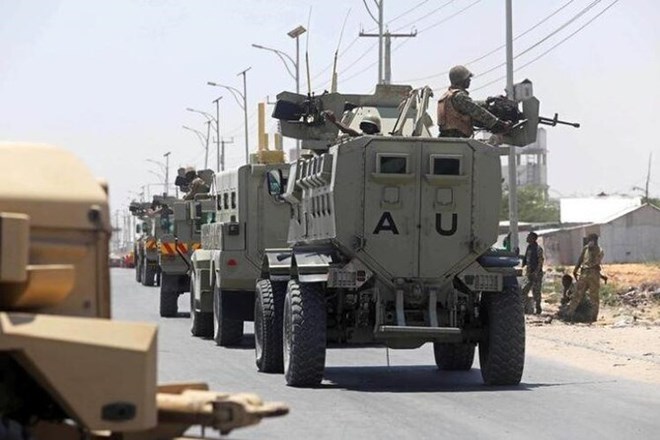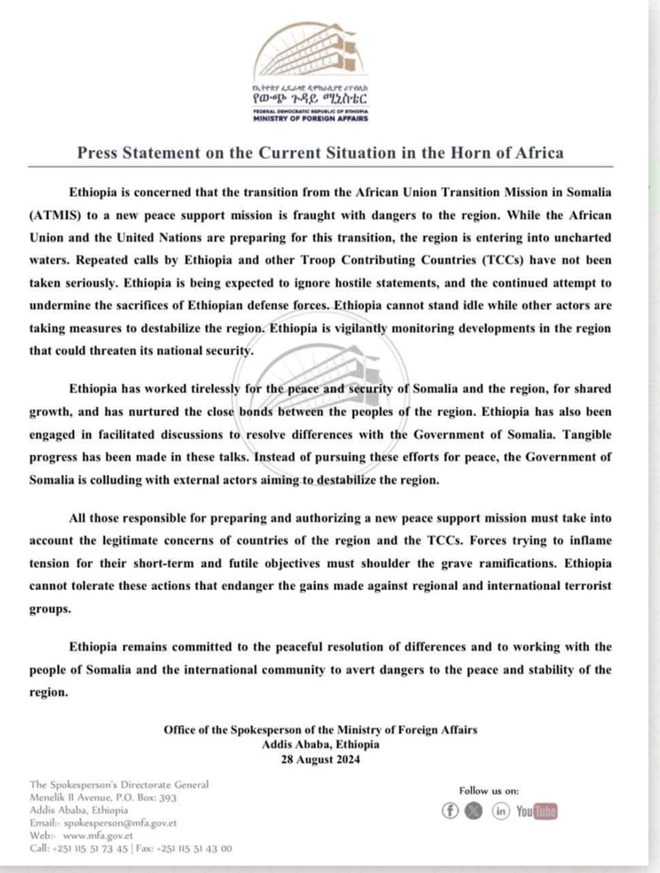
Thursday August 29, 2024
By Mohamed Samir
Ethiopia has accused Somalia of “colluding with external actors” to destabilise the region, following Somalia’s refusal to include Ethiopian troops in the upcoming African Union Support Mission in Somalia (AUSSOM).
The Ethiopian Foreign Ministry statement, released on Wednesday, comes after Somalia’s Prime Minister Hamza Abdi Barre declared last week that Ethiopian forces would not be part of the AUSSOM unless Ethiopia withdraws from a controversial memorandum of understanding (MoU) signed with Somaliland earlier this year.
The MoU, which grants Ethiopia access to 20 kilometres of the Red Sea coastline in exchange for potential recognition of Somaliland’s independence, has been condemned by Somalia as a violation of its sovereignty and territorial integrity.
“All those responsible for preparing and authorising a new peace support mission must take into account the legitimate concerns of countries of the region and the TCCs,” the Ethiopian statement said. “Forces trying to inflame tension for their short-term and futile objectives must shoulder the grave ramifications. Ethiopia cannot tolerate these actions that endanger the gains made against regional and international terrorist groups.”
The Ethiopian statement, which goes against all diplomatic norms and international law, came after Egypt and Somalia signed a defence pact and military cooperation protocol, reaffirming their commitment to strengthening bilateral ties and bolstering regional security.
Somalia has consistently rejected Ethiopia’s involvement in AUSSOM, arguing that the host country should have the final say in member selection, as per African Union (AU) and United Nations Security Council (UNSC) resolutions.
“No country can impose membership on Somalia. Somalia will stay sovereign in this process,” said Somalia’s Foreign Minister Ahmed Moallim Fiqi.
The Ethiopian statement also criticized the AU and the UN for not taking seriously repeated calls from Ethiopia and other Troop Contributing Countries (TCCs).
“Ethiopia is being expected to ignore hostile statements and the continued attempt to undermine the sacrifices of Ethiopian defence forces,” the statement said. “Ethiopia cannot stand idle while other actors are taking measures to destabilize the region.”
The international community, including the UN, the AU, and the Arab League, has expressed support for Somalia’s sovereignty and called for a peaceful resolution to the dispute. Somalia is coordinating with allies, including Egypt and Djibouti, to ensure that the new peacekeeping mission, AUSSOM, effectively addresses the nation’s security needs without Ethiopian involvement.
Internal Conflicts Complicate Ethiopian Position
The dispute with Somalia comes as Ethiopia grapples with internal strife and conflicts in two of its most important regions: Oromia and Amhara.
Despite the end of a two-year war in the northern region of Tigray in November 2022, there are still a myriad of conflicts in the country, including in the Amhara and Oromia regions.
In early August, Amnesty International reported that rights violations continue “unabated” in Amhara, while reports of atrocities in Tigray and abuses in Oromia “have largely gone unaddressed.”
“Despite claims of commitment to justice, mainly through so-called transitional justice mechanisms, Ethiopian authorities have failed to halt these violations,” Amnesty said.
Self-defence militias in Amhara known as Fano, who fought alongside federal troops in the war against Tigrayan rebels, turned against them last year after Prime Minister Abiy Ahmed’s government announced it was dissolving regional forces.
Fano militias, who represent an armed manifestation of the longstanding grievances of the Amhara people, have sought to establish a new order grounded in equality among all groups, respect for individual rights, rule of law, and democracy.
Ethiopia’s largest and most populous region, Oromia has been in the grip of an armed insurrection since 2018. The Oromo Liberation Front (OLF) renounced armed struggle after Abiy, himself an ethnic Oromo, came to power. Accordingly, the Oromo Liberation Army (OLA) broke off from the OLF and started fighting, a string of armed groups in Oromia have risen up claiming to be part of its cause, although they are only loosely tied.
The Amhara conflict coexists with a no-war-no-peace situation in the Tigray region, where famine-like conditions and starvation-induced deaths have been reported, and armed confrontation, kidnappings, and regular travel disruptions in the Oromia region.
